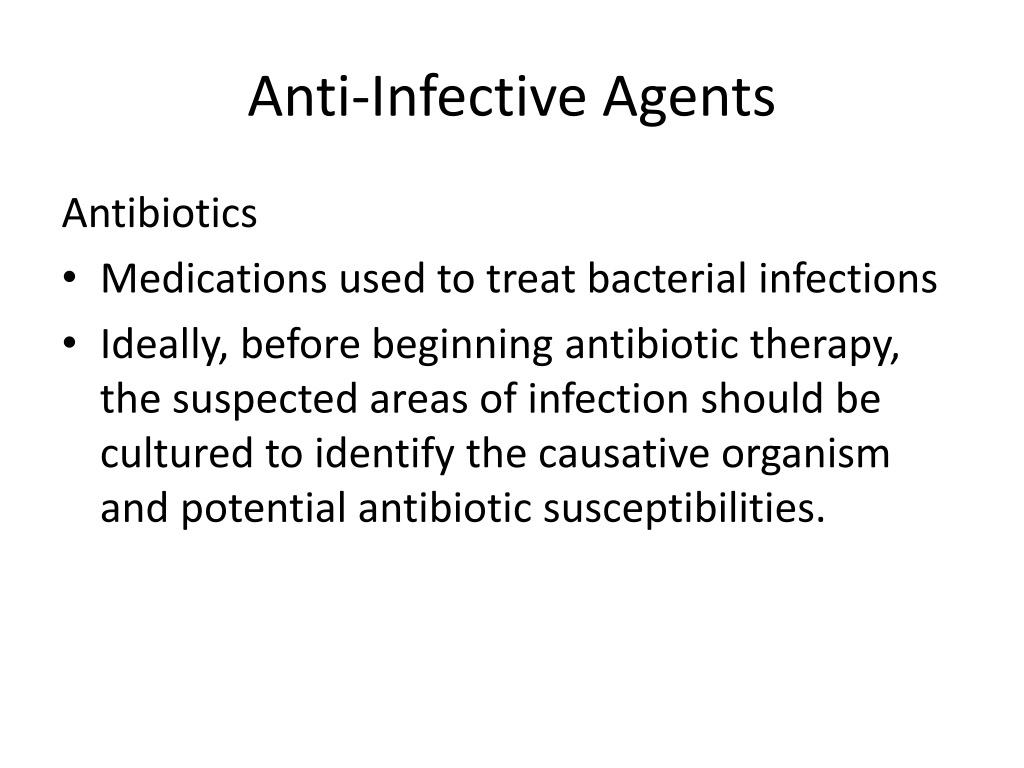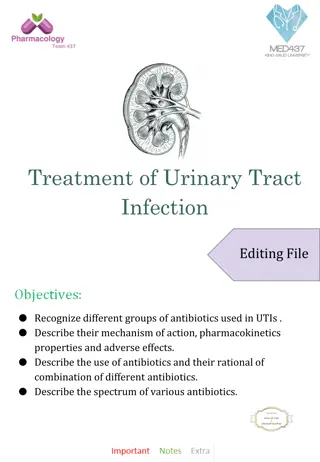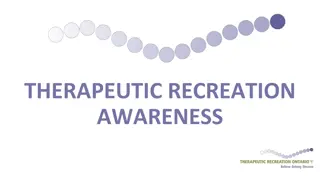Understanding Antibiotics: Nursing Implications and Therapeutic Considerations
Antibiotics are essential medications used to treat bacterial infections. Before initiating antibiotic therapy, it is crucial to culture the suspected infection sites to identify the causative organism and select appropriate antibiotics. Nursing implications include assessing for drug allergies, monitoring for side effects, ensuring proper medication adherence, and educating patients on the importance of completing the full course of antibiotics. Cultures should be obtained before starting therapy, and patients should be monitored for signs of superinfection. Each class of antibiotics has specific side effects and interactions that need careful assessment.
Download Presentation

Please find below an Image/Link to download the presentation.
The content on the website is provided AS IS for your information and personal use only. It may not be sold, licensed, or shared on other websites without obtaining consent from the author. Download presentation by click this link. If you encounter any issues during the download, it is possible that the publisher has removed the file from their server.
E N D
Presentation Transcript
Anti-Infective Agents Antibiotics Medications used to treat bacterial infections Ideally, before beginning antibiotic therapy, the suspected areas of infection should be cultured to identify the causative organism and potential antibiotic susceptibilities.
Antibiotics Empiric therapy: treatment of an infection before specific culture information has been reported or obtained Prophylactic therapy: treatment with antibiotics to prevent an infection, as in intra- abdominal surgery
Antibiotics Bactericidal: kill bacteria Bacteriostatic: inhibit growth of susceptible bacteria, rather than killing them immediately; will eventually lead to bacterial death
Antibiotics: Nursing Implications Before beginning therapy, assess drug allergies; hepatic, liver, and cardiac function; and other lab studies. Be sure to obtain thorough patient health history, including immune status. Assess for conditions that may be contraindications to antibiotic use, or that may indicate cautious use. Assess for potential drug interactions.
Antibiotics: Nursing Implications It is ESSENTIAL to obtain cultures from appropriate sites BEFORE beginning antibiotic therapy.
Antibiotics: Nursing Implications Patients should be instructed to take antibiotics exactly as prescribed and for the length of time prescribed; they should not stop taking the medication early when they feel better. Assess for signs and symptoms of superinfection: fever, perineal itching, cough, lethargy, or any unusual discharge.
Antibiotics: Nursing Implications Each class of antibiotics has specific side effects and drug interactions that must be carefully assessed and monitored.
Antibiotics: Nursing Implications The most common side effects of antibiotics are nausea, vomiting, and diarrhea. All oral antibiotics are absorbed better if taken with at least 6 to 8 ounces of water.























